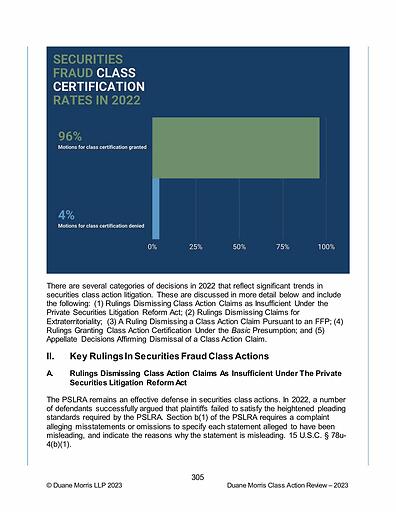Duane Morris Class Action Review - 2023 - Report - Page 308

June 7, 2022), denied the defendant’s argument that scheme liability claims must be
independent and distinct from misstatement or omission claims. Strougo recognized
these decisions as a growing trend among post-Lorenzo courts. It is unclear at this time
if courts outside the Second Circuit will adopt the limited scope of Rio Tinto or continue
to follow a broader interpretation of Lorenzo.
B.
Rulings Dismissing Claims For Extraterritoriality
Two recent cases illustrate the difficulties that users of digital and online exchanges can
face in bringing a class action securities claim. Federal securities laws do not apply
extraterritorially; they apply solely to transactions involving securities traded on
domestic exchanges or to domestic transactions in other securities. Where plaintiffs
cannot demonstrate that a liability was incurred within the United States, their claims
may be subject to dismissal.
In Anderson, et al. v. Binance, 2022 U.S. Dist. LEXIS 60703 (S.D.N.Y. Mar. 31, 2022),
the plaintiffs brought putative class claims under the Securities Act, the Exchange Act,
and state Blue Sky laws against Binance, a digital exchange that sold digital tokens to
the plaintiffs. These tokens are deemed securities by the SEC, but Binance did not
register as an exchange nor did it file registration statements for the tokens. In addition
to being barred by the relevant statute of limitations, the claims were dismissed on the
basis of extraterritoriality. The court opined that the plaintiffs failed to allege that
Binance, which is based in Malta, had sufficient contacts within the United States. The
court reasoned that merely alleging that an order was placed in the United States is
insufficient to invoke the federal securities laws.
Similarly, although it certified a class in In Re Aphria, Inc. Securities Litigation, 2022
U.S. Dist. LEXIS 156400 (S.D.N.Y. Aug. 30, 2022), the court dismissed one of the two
proposed lead plaintiffs because she failed to show that she engaged in a domestic
transaction in securities. The court found that the placement of a purchase order with
her U.S.-based broker, TD Ameritrade, by itself did not suffice.
C.
Ruling Dismissing A Class Action Claim Pursuant To An FFP
Whether state courts outside of Delaware will uphold FFPs for Delaware corporations
has been an open question since Sciabacucchi was decided. In 2022, the California
Court of Appeal issued a decision that suggests the recent decline in state court class
actions may continue.
In Wong, et al. v. Restoration Robotics, Inc., 78 Cal. App. 5th 48 (Cal. App. 1st Dist.
2022), Restoration Robotics, a Delaware corporation headquartered in California,
included an FFP in its S-1 Registration Statement for an IPO. Restoration filed its
certificate of incorporation with its final S-1, which included the following provision from
Article VIII of the certificate: “Unless the Corporation consents in writing to the selection
of an alternative forum, the federal district courts of the United States of America shall
be the exclusive forum for the resolution of any complaint asserting a cause of action
arising under the Securities Act of 1933, as amended. Any person or entity purchasing
307
© Duane Morris LLP 2023
Duane Morris Class Action Review – 2023













